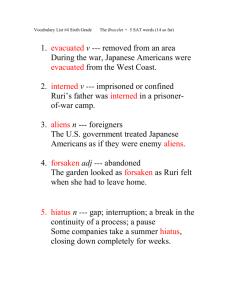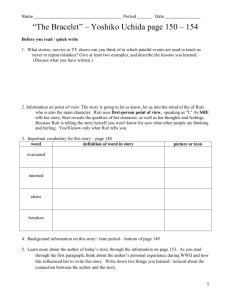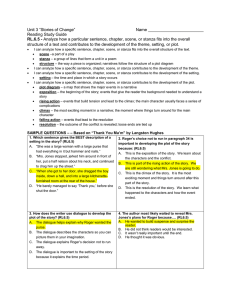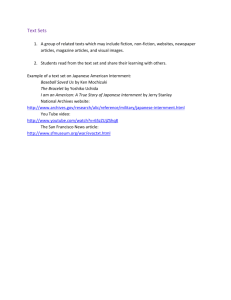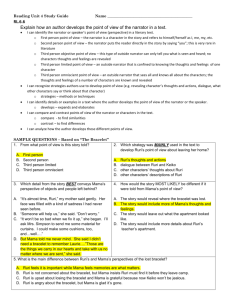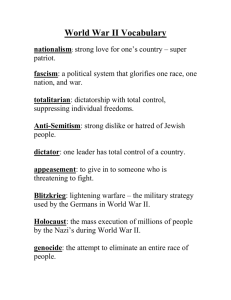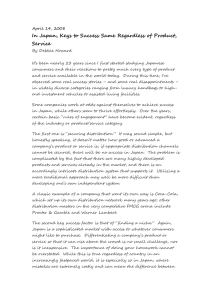"The Bracelet" Lesson Plan: Japanese Internment & Discrimination
advertisement
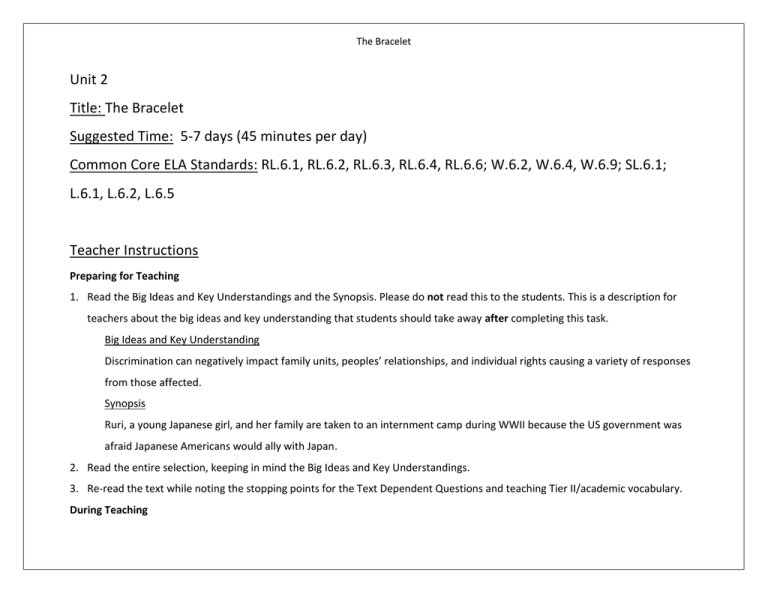
The Bracelet Unit 2 Title: The Bracelet Suggested Time: 5-7 days (45 minutes per day) Common Core ELA Standards: RL.6.1, RL.6.2, RL.6.3, RL.6.4, RL.6.6; W.6.2, W.6.4, W.6.9; SL.6.1; L.6.1, L.6.2, L.6.5 Teacher Instructions Preparing for Teaching 1. Read the Big Ideas and Key Understandings and the Synopsis. Please do not read this to the students. This is a description for teachers about the big ideas and key understanding that students should take away after completing this task. Big Ideas and Key Understanding Discrimination can negatively impact family units, peoples’ relationships, and individual rights causing a variety of responses from those affected. Synopsis Ruri, a young Japanese girl, and her family are taken to an internment camp during WWII because the US government was afraid Japanese Americans would ally with Japan. 2. Read the entire selection, keeping in mind the Big Ideas and Key Understandings. 3. Re-read the text while noting the stopping points for the Text Dependent Questions and teaching Tier II/academic vocabulary. During Teaching The Bracelet 1. Students read the entire selection independently. 2. Teacher reads the text aloud while students follow along or students take turns reading aloud to each other. Depending on the text length and student need, the teacher may choose to read the full text or a passage aloud. For a particularly complex text, the teacher may choose to reverse the order of steps 1 and 2. 3. Students and teacher re-read the text while stopping to respond to and discuss the questions, continually returning to the text. A variety of methods can be used to structure the reading and discussion (i.e., whole class discussion, think-pair-share, independent written response, group work, etc.) Text Dependent Questions Text-dependent Questions Why were Ruri and her family being evacuated? Evidence-based Answers The United States and Japan were at war, and every Japanese person was being evacuated by the government to a concentration camp. How did Ruri feel about leaving home? Use textual evidence from the text that support your answer. Ruri was feeling upset. In paragraph one, Ruri says she hadn’t planned to cry, but her tears came suddenly. In paragraph two, Ruri notices that her mother’s face was filled with a kind of sadness she had never seen before. In paragraph three, Ruri decribes the emptiness of the house. She commented that the house was like a gift box after the nice thing inside was gone. In paragraph four, Ruri comments that she is not moving to a nicer home, but being sent to a concentration camp. In paragraph five, Ruri wishes it would be a messenger at the door saying it was a terrible mistake that they wouldn’t have to leave at all. All of these are signs that Ruri was upset. The text states that Ruri runs to answer the door before her How does Ruri react to the doorbell ringing? What does this The Bracelet tell the reader about Ruri character? What happened to Ruri’s father and other Japanese Americans? Why did this happen? Why does Ruri see this event as ironic? What does the simile “her face drooped like a wilted tulip” tell you about Laurie? Why does Uchida use this simile? Compare and contrast the characters Laurie and Ruri. What is the significance of Laurie and Ruri’s friendship under these circumstances? What is the consequence for each of the girls due to their difference in ethnicity? sister thinking it could be a messenger from the government saying it was a terrible mistake, and they didn’t have to leave or a telegram from her father. This shows that Ruri is a hopeful person. She has not entirely accepted that the relocation will happen. Even though they are already packed and about to leave, she is still hoping for some kind of miracle that will bring her father back or keep them from going to the internment camp. She is hoping for the best. Ruri explains that her father was interned in a prisoner of war camp in Montana because he had worked for a Japanese business firm. The FBI picked up Papa and other Japanese Americans on the day Pearl Harbor was bombed. Ruri saw this as ironic because she knew Papa was not dangerous. The simile “her face drooped like a wilted tulip” means that even though Laurie is not Japanese American, she is still affected by the evacuation because losing her friend, Ruri, has made her sad. The author uses the simile to give a better description of Laurie’s sadness. This makes the story more interesting. The text provides evidence that Ruri was of Japanese descent based on the fact that her father was a Japanese community leader. We can also infer that Laurie is not Japanese because she has long blonde pigtails. The reader can tell that Laurie and Ruri live in the same neighborhood when Ruri says that Laurie was from next door, and that they were the same age and both attended Lincoln Junior High together. Ruri and Laurie’s friendship indicates that they are not prejudiced against people who come from different ethnic backgrounds. Additionally, they provide the contrast to what so many other people are feeling, which is fear, thus causing Japanese Americans to be interned. The Bracelet The consequence for Ruri being Japanese was being sent to the internment camp simply for being of Japanese descent. Laurie’s consequence was being left behind while her best friend had to leave simply because she was not of Japanese descent. Describe the gift Laurie gives to Ruri. What does the gift symbolize? It is stated that Laurie gave Ruri a small gold chain bracelet with a heart dangling on it. It symbolizes keeping friendship in your heart forever. Describe the preparations Ruri and her mother had to complete Ruri explains that the house was cleared out and each person to make the move. could pack only two suitcases. Dishes, blankets and sheets also had to be packed. Mama packed these items in an enormous duffel bag along with umbrellas, boots, a kettle, hot plate and a flashlight. How does Ruri’s mother react to the need to pack? What does Ruri’s mother says she doesn’t know how they are going to the reader learn about her character through this process? pack the things the government is requiring them to bring. She simply starts packing them into a large duffel bag. When Ruri expresses her concern about how they will manage to carry such a large bag, her mother simply says, “Someone will help us. Don’t worry.” This indicates that Ruri’s mother has a positive attitude. The fact that she believes there is a way to pack what they need and that they will get help to carry the bag shows she tries to make the best out of every situation. What was on each of Ruri’s suitcases? From where did the The reader learns that each of Ruri’s suitcases has a tag with number come? her name and family number. Every Japanese family had to What did having a number instead of a name do to the register and get a number from the United States government. Japanese people? The numbers were just an easier way to keep track of such a large mass of people. Numbers were also easier than Japanese names for Americans. The government also gave them a number instead of a name to dehumanize them. It was easier to treat a number rather than a family in such a discriminatory The Bracelet way. Ruri describes the flower garden in their yard and her memories of the irises. Why does the author describe this scene of the past and then describe what the garden looks like now? Describe the mood at the Civil Control Station. What evidence did you use to determine this mood? What is the significance of the sign, “We are loyal Americans.” hanging on the Japanese food store? Why are the windows boarded up? Why does the author include Ruri’s thoughts, “I felt as though I was going into a prison, but I hadn’t done anything wrong” when they reach the internment camp? The author describes the garden and Ruri’s memories of the irises to show that Ruri’s parents loved each other very much because Papa would cut the first iris blossom and give it to momma. Mama would say thank you papa san. San is a term of respect. Then the author describes the garden as it looks now to show that Papa was gone and mama was too busy to take care of the garden so it looked empty and abandoned. This symbolizes the abandonment that the Japanese Americans felt when the US government suddenly lost trust in them. The mood was one of fear and confusion. Ruri states that she was scared “for a minute I thought I was going to lose my breakfast in front of everybody.” There were over a thousand Japanese people both laughing and crying. Ruri guessed that everyone else was scared too and no one knew what was going to happen. What scared Ruri the most were the soldiers carrying guns with mounted bayonets! The sign is hanging on the Japanese food store because most of the Japanese that were being evacuated were American citizens because they were born here. They were largely loyal to America and its cause in the war and were trying to show their support. Businesses were closed and people lost their livelihoods as well as their homes in the move. The author includes these thoughts because she wants to show that the Japanese Americans had done nothing wrong but they were forced behind the barbed wire with armed guards at the gate just as prisoners would be treated. This shows how the fear the US government had of the Japanese Americans was unfounded. The Bracelet How did the doctors check to see if the evacuated citizens had any diseases? What is the significance of this treatment of the Japanese Americans? Does the apartment meet Ruri’s expectations? Use textual evidence to explain your answer. What qualities of the mother are evident in the story? Use textual evidence to tell how you know. What do these qualities say about her character? Ruri describes the doctors’ treatment. She says the doctors “looked down our throats and peeled back our eyelids.” This inspection is similar to the way someone would inspect cattle or a veterinarian would inspect pets. They are being treated like animals by Americans, at this time in history, because they of Japanese descent. The apartment does not meet Ruri”s expectations. She expects an enormous building that is elegant and has an elevator with thick carpet hallways. In actuality, the apartment was a dark, narrow, empty stable stall that still smelled like horses. The floor was covered with dust and one light bulb dangled from the ceiling. The reader can infer that Mama has a positive and calm attitude. Mama didn’t worry about who carried the huge sack. Mama said, “Someone will help us. Don’t worry.” Mama was doing what was expected of her. She did not show signs of rebellion or fear. She was dutiful and courageous. Ruri explains that Mama didn’t cry, she just went out to borrow a broom and began sweeping. This shows that Mama was strong and was a good leader in her family. She was trying to make the best she could out of the situation they were in. She did not let her pride get in the way of making a place a home. She showed warmth and strong will. When Ruri lost her bracelet, mama says she doesn’t need it to remember Laurie. Mama said that they did not need anything to remember what they left behind. “Those are things we carry in our hearts and take with us no matter where we are sent,” she said. This shows that Mama is caring and understanding. She does not put a lot of value on material things and feels that important memories will stay with you. She reassures Ruri with that statement. The Bracelet The Bracelet Meaning needs to be provided Meaning can be learned from context Tier II/Academic Vocabulary These words require less time to learn These words require more time to learn (They are concrete or describe an object/event/ process/characteristic that is familiar to students) (They are abstract, have multiple meanings, are a part of a word family, or are likely to appear again in future texts) [evacuated] [interned] [alien] [forsaken] [register] [abandoned] [army barracks] [bayonets] [stall] [cot] [citizens] [concentration camp] The Bracelet Culminating Writing Task Prompt This story explains how Japanese Americans were discriminated against after Japan attacked Pearl Harbor in World War II. Describe this discrimination. Then choose three characters from the story and describe how this discrimination impacted their lives and how they responded. Teacher Instructions 1. Students identify their writing task from the prompt provided. 2. Students complete an evidence chart as a pre-writing activity. Teachers should guide students in gathering and using any relevant notes they compiled while reading and answering the text-dependent questions earlier. Some students will need a good deal of help gathering this evidence, especially when this process is new and/or the text is challenging! Evidence Quote or paraphrase It was April 21, 1942. The United States and Japan were at war, and every Japanese person on the West Coast was being evacuated by the government to a concentration camp. The Government had come to pick up Papa and hundreds of other Japanese community leaders…The government thought that they were dangerous enemy aliens.’ He was “interned in a prisoner-of-war camp in Montana because he had worked for a Japanese business firm.” “We had been instructed to take only what we could carry into camp …Mama had told us we Elaboration / explanation of how this evidence supports ideas or argument A blanket evacuation of all Japanese was not fair. Family units were separated .Even though some of these people were “community leaders”, they were still thought of as dangerous. The father was taken away forcing Mama to take care of the children alone and to deal with the evacuation without him. The families were forced to leave most of their possessions behind. Keiko’s question to her The Bracelet could only take two suitcases.” Keiko asks her mama how they were going to carry the huge sack that the dishes, blankets and sheets were in. Mama replies “Someone will help us.” “I didn’t know if I would ever get back to Berkley again.” “I wondered who would be sitting in my desk at Lincoln Junior High now that I was gone. “He (Papa) had lived there since 1917.” “I picked up my two suitcases. Each one had a tag with my name and our family number on it.” mother shows that she is concerned about how they are going to be able to carry their essentials. Mama’s reply shows that she has a positive attitude and that she has faith in human nature. It could also be that she is being protective of her child, not wanting her to know how scared she (Mama) is at what happened to them. Ruri was uncertain if she would ever get to go back to the only place that she had ever lived. Ruri was forced to leave her school and her home and she had done nothing wrong. The author tells us that Papa had been there since 1917 to show that he had been a resident for a long time. Also, there is no indication that in that amount of time, he had ever been in trouble or caused trouble. Every Japanese family was given a number. This de-humanizes them. They are not being treated like individuals with rights. “But the garden looked shabby and forsaken now that Papa was gone and Mama was too busy to take care of it. It looked the way I felt, sort of empty and lonely and abandoned” The author has this passage about the garden because it shows how the family used to have order, peace and beauty and now things are disheveled. He mother has to take care of important things by herself leaving the beautiful garden aside. The children had to cope with what the unfair circumstances. “No one knew exactly what was going to happen Ruri’s family had to go without knowing what was The Bracelet to us.” “What scared me the most were the soldiers standing in the doorway of the church hall. They were carrying guns with mounted bayonets. I wondered if they thought we would try to run away and whether they’d shoot us or come after us with their bayonets if we did.” “The crazy thing about the whole evacuation was that we were all loyal Americans. Most of us were citizens because we were born here. But our parents, who had come from Japan, couldn’t become citizens because there was a law that prevented any Asian from becoming a citizen. Now everybody with a Japanese face was being shipped off to concentration camps.” “It’s stupid,” Keiko muttered. “If there were any Japanese spies around, they’d have gone back to Japan a long time ago.” “Mama! We’re going to live in an apartment.” “A house was all right but an apartment seemed elegant and special.” “Mama looked at my sister and then at me. It won’t be so bad when we fix it up.” “Mama didn’t cry. She just went out to borrow a broom and began sweeping out the dust and dirt.” going to happen to them or exactly where they were going. It was a time of uncertainty for the whole family. This shows the distrust that the government had for the Japanese. They had armed soldiers guarding them. This made Ruri feel afraid. American citizens were being treated like criminals. Asians were being discriminated against. Keiko is showing her feelings about the situation. Ruri was still optimistic even after they arrived at the camp. She thought that an apartment would be special. Mama always seemed to be positive with her responses and reactions. The Bracelet 3. Once students have completed the evidence chart, they should look back at the writing prompt in order to remind themselves what kind of response they are writing (i.e. expository, analytical, argumentative) and think about the evidence they found. (Depending on the grade level, teachers may want to review students’ evidence charts in some way to ensure accuracy.) From here, students should develop a specific thesis statement. This could be done independently, with a partner, small group, or the entire class. Consider directing students to the following sites to learn more about thesis statements: http://owl.english.purdue.edu/owl/resource/545/01/ OR http://www.indiana.edu/~wts/pamphlets/ thesis_statement.shtml. 4. Students compose a rough draft. With regard to grade level and student ability, teachers should decide how much scaffolding they will provide during this process (i.e. modeling, showing example pieces, sharing work as students go). 5. Students complete final draft. Sample Answer The story “The Bracelet” by Yoshiko Uchida tells the rippling effects of the attack on the American military base at Pearl Harbor by the Japanese through a middle school girl’s eyes. After the Japanese attacked Pearl Harbor, the United States Government insisted that all Japanese Americans be evacuated to internment camps. Every Japanese American on the West Coast was forced to abandon their home and pack only what they could carry with them. Most Japanese American children were native citizens, but their parents were not because a law prohibited them from becoming citizens. Regardless of whether the Japanese were citizens or not, they were considered suspicious of collaborating with the enemy and were forced to evacuate. On the day of the attack, government officials sought out and apprehended Japanese American community leaders because they were considered “dangerous enemy aliens”. Although all Japanese Americans were displaced from their homes, they were never told what was going to happen to them; they were only told where they were supposed to go, and were accounted for and The Bracelet organized by their registered family number, assigned to them just as their new residence was. This blatant racial discrimination impacted family units, people’s relationships, and individual rights, causing Japanese Americans to react in a variety of ways. Ruri, the main character in “The Bracelet”, was forced to pack her entire childhood into two suitcases, leave her friends, school, and home full of memories: everything she knew and everything that was comfortable. Her father had been taken away the day of the attack, leaving her alone with her sister and mother. Her father’s pride was the flower garden and it “looked shabby and forsaken now that Papa was gone and Mama was too busy to take care of it. It looked the way I felt, sort of empty and lonely and abandoned.” These were feelings which most Japanese American children had to cope with, as their own circumstances were often similar. Ruri was nervous because there was so much she did not know: who would help them carry all their bags, where were they going to live, what was going to happen to her and her family, or whether she would ever go back to Berkeley. Frightened when she arrived at the Civil Control Station and saw soldiers “…carrying guns with pointed bayonets, [she] wondered if they thought [they] would try to run away and whether they’d shoot [them] or come after [them] with their bayonets,”. Despite all her apprehensive feelings, Ruri remained optimistic; upon arriving at the internment camp and learning her family was to stay in an apartment, she believed it was possible that their apartment was going to be “elegant and special”. Though she did not share the same naïve optimism as Ruri, Ruri’s mother did manage to maintain a positive outlook during their relocation. She had to take care of her house and children alone because her husband was interned at a prisoner-of-war camp in Montana, forcing her to take on more responsibilities than before. She was deeply saddened that she had to uproot her family and leave the home she had lived in for fifteen years, but when her daughters expressed worry or concern she remained calm and reassured them not by having all the answers, but by being hopeful that things would work out and focusing on accomplishing necessary tasks. When her daughters asked her how they were going to pack everything they needed she responded simply, “I don’t really know,” and plainly kept packing all those impossibly many and large items into an enormous duffel bag. Also, when arriving at their apartment at the internment camp, and seeing her daughters’ crestfallen expressions, she The Bracelet did not break down and cry as most women would. Instead, she “just went out to borrow a broom and began sweeping out the dust and dirt,” then asked the girls to set up the cots. Her understanding and selfless nature enabled her to remain strong and put her daughters’ needs above her own, changing her depressing experience into an example of wisdom and strength. Keiko was not yet as wise as her mother, but was old enough to more fully understand the injustice of the situation. She too had to cope with moving away from all of her friends and leave behind her home and all that was familiar. Unlike her younger sister, Ruri, Keiko was not so optimistic. She expressed disbelief, doubt and concern as they packed up their home and readied themselves for their uncharted journey. Angry and resentful, she expressed her distaste for the evacuation, saying “It’s stupid…If there were any Japanese spies around, they’d have gone back to Japan long ago.” She felt the entire situation was unfair. The discrimination the government displayed with Japanese Americans after the attack on Pearl Harbor was unjustified. These Americans had done nothing to deserve such judgment and mistreatment. Due to the government’s actions of evacuating people purely because of their race, Japanese Americans felt misjudged, persecuted without cause, and began to lose trust in their nation’s leaders. Uchida shared this experience not only so that people would know how she felt and share what happened to the Japanese people, but largely “so it won’t ever happen again.” Additional Tasks Begin with a whole class, small group, or partner discussing the following: Suppose that Ruri’s mother told the story. What might she say about the events that Ruri describes? How might Laurie tell the story? Then, as an independent activity have students retell a scene using a different first-person point of narrator. Answer: Laurie’s point of view: The Bracelet When I found out that my best friend, Ruri, had to move to the internment camp, it made me really sad. I bought her a gift to remember our friendship. It was a thin gold chain with a heart dangling on it. I walked to her house and knocked on the door. Ruri opened the door and seemed surprised to see me. “Hi,” I said. “I came to say goodbye.” I handed her the gift telling her it was a bracelet before she could even open it. “Put it on so you won’t have to pack it.” I knew they didn’t have much space to pack anything else. I helped her put it on and she told me she would never take it off. That made me feel special, yet made my heart ache. I didn’t know what else to say, so I just said, “Well, goodbye then. Come home soon.” I wondered if she ever really would. I walked backwards for a while because I knew I might never see Ruri again. I kept turning and waving goodbye until Ruri closed the door. I knew I would never forget my best friend, Ruri. The Bracelet Name _____________________________________________ Date ________________ “The Bracelet” 1. Why were Ruri and her family being evacuated? 2. How did Ruri feel about leaving home? Use textual evidence from the text that support your answer. 3. How does Ruri react to the doorbell ringing? What does this tell the reader about Ruri character? 4. What happened to Ruri’s father and other Japanese Americans? Why did this happen? Why does Ruri see this event as ironic? 5. What does the simile “her face drooped like a wilted tulip” tell you about Laurie? Why does Uchida use this simile? The Bracelet 6. Compare and contrast the characters Laurie and Ruri. What is the significance of Laurie and Ruri’s friendship under these circumstances? What is the consequence for each of the girls due to their difference in ethnicity? 7. Describe the gift Laurie gives to Ruri. What does the gift symbolize? 8. Describe the preparations Ruri and her mother had to complete to make the move. 9. How does Ruri’s mother react to the need to pack? What does the reader learn about her character through this process? 10. What was on each of Ruri’s suitcases? From where did the number come? What did having a number instead of a name do to the Japanese people? The Bracelet 11. Ruri describes the flower garden in their yard and her memories of the irises. Why does the author describe this scene of the past and then describe what the garden looks like now? 12. Describe the mood at the Civil Control Station. What evidence did you use to determine this mood? 13. What is the significance of the sign, “We are loyal Americans.” hanging on the Japanese food store? Why are the windows boarded up? 14. Why does the author include Ruri’s thoughts, “I felt as though I was going into a prison, but I hadn’t done anything wrong” when they reach the internment camp? 15. How did the doctors check to see if the evacuated citizens had any diseases? What is the significance of this treatment of the Japanese Americans? The Bracelet 16. Does the apartment meet Ruri’s expectations? Use textual evidence to explain your answer. 17. What qualities of the mother are evident in the story? Use textual evidence to tell how you know. What do these qualities say about her character?
